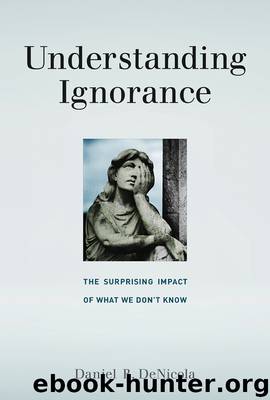Understanding Ignorance by DeNicola Daniel R.;

Author:DeNicola, Daniel R.;
Language: eng
Format: epub
Tags: philosophy; epistemology; learning; knowledge; unknowing
Publisher: MIT Press
Published: 2017-09-22T00:00:00+00:00
Ignorance, Action, and Responsibility
Aristotle set the framework for analyzing the relation of ignorance to voluntary action—and hence to moral responsibility.17 He observes that actions that are coerced or produced by external forces are not voluntary. Aristotle also asserts that actions are not voluntary if they are done because of ignorance. Speaking broadly, for an action to be considered voluntary, the agent must know what she is doing. But this claim requires further distinctions, for which I will use a more contemporary situation.
Imagine passengers on a train that is equipped with an emergency cord that will stop the train precipitously. There are three ways to pull the cord. (1) Sarah pulls the cord deliberately, knowing what she is doing. This is a voluntary act for which we might praise or blame her depending on the reason for her act. (2) Philip pulls the cord thinking it is used to call the conductor. Philip acts from ignorance; in a sense, he does not know what he is doing. The action is not voluntary. (3) Michelle is very drunk and pulls the cord; in a different sense, she too does not know what she is doing. She pulls the cord in ignorance, not from ignorance. Oddly, Aristotle gives some classificatory weight to the agent’s feelings post factum: if Michelle regrets her drunken act when she is sober, it was a “nonvoluntary” action (neither voluntary nor involuntary).
From our perspective, the responsibility we bear for our ignorance forms a continuum. Recall Tom and his soup? If a chef unknowingly were to serve Tom soup that contained a poison, he would be acting from ignorance, not voluntarily. In Aristotle’s terms, he was ignorant of the particulars of the case: he did not know there was poison in the soup. We do not blame or condemn the chef. (The chef might feel that he was in some sense responsible, that the action was piacular if not immoral.) But suppose the chef knew there was arsenic in the soup but was ignorant of the commonly known fact that arsenic is poisonous: his ignorance is more culpable, though the act of poisoning is not intentional. But, if the chef was, as Aristotle would say, ignorant of universals and somehow did not know that poisoning was wrong, we are likely either to show little tolerance for his ignorance and hold him fully responsible, or—if he is unable to tell right from wrong in general—treat him as sociopathic or mentally incompetent and in need of therapy.
As I noted earlier, we may rightly be held responsible for our ignorance based on a wide range of factors, but ignorance may also serve as an excuse. Professions of ignorance are often used to deny responsibility. Genuinely exculpatory ignorance that has resulted in a tragic or harmful outcome involves the agent’s unknown unknowns, or things the agent could not have known or had no occasion or obligation to know.18
Download
This site does not store any files on its server. We only index and link to content provided by other sites. Please contact the content providers to delete copyright contents if any and email us, we'll remove relevant links or contents immediately.
The remains of the day by Kazuo Ishiguro(8999)
Tools of Titans by Timothy Ferriss(8396)
Giovanni's Room by James Baldwin(7346)
The Black Swan by Nassim Nicholas Taleb(7129)
Inner Engineering: A Yogi's Guide to Joy by Sadhguru(6796)
The Way of Zen by Alan W. Watts(6614)
The Power of Now: A Guide to Spiritual Enlightenment by Eckhart Tolle(5781)
Asking the Right Questions: A Guide to Critical Thinking by M. Neil Browne & Stuart M. Keeley(5775)
The Six Wives Of Henry VIII (WOMEN IN HISTORY) by Fraser Antonia(5515)
Astrophysics for People in a Hurry by Neil DeGrasse Tyson(5190)
Housekeeping by Marilynne Robinson(4447)
12 Rules for Life by Jordan B. Peterson(4304)
Ikigai by Héctor García & Francesc Miralles(4274)
Double Down (Diary of a Wimpy Kid Book 11) by Jeff Kinney(4272)
The Ethical Slut by Janet W. Hardy(4253)
Skin in the Game by Nassim Nicholas Taleb(4248)
The Art of Happiness by The Dalai Lama(4130)
Skin in the Game: Hidden Asymmetries in Daily Life by Nassim Nicholas Taleb(4007)
Walking by Henry David Thoreau(3962)
